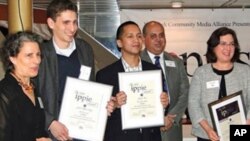New York City boasts a vibrant, diverse media landscape, with an estimated 350 weekly newspapers and 26 foreign language dailies.
Each year, the best work by reporters, photographers and editors of New York’s ethnic and independent media is honored with awards from the New York Community Media Alliance (NYCMA). Those awards are known as Ippies.
NYCMA director Juana Ponce de Leon explains that the ethnic press often advocates for its communities, and acts as an intermediary between the audience and mainstream society.
She adds that her organization encourages reporters to offer practical guidance to readers, listeners and viewers.
"It helps the communities know where there are resources to address their concerns. It’s not good enough to say ‘We don’t have enough translation services from the DOE [Department of Education]’ and leave it at that. It’s better to say ‘Not only are there those services, but if you don’t find them, you can request them. And if they don’t come to you, then you have a right to get your child to another school, for instance.’"
The ethnic media often provides immigrants with the tools they need to negotiate everyday life in America, says 2011 Ippie winner Helen Zelon.
"I think the ethnic press does an enormous service when it explains to people, ‘This is what happens when your kid starts school. This is what happens when you rent something. Here’s how you establish yourself here.’"
Zelon, a reporter with City Limits Magazine, a public policy journal, often writes about education.
"Which means you are writing about race and class and money and politics and power and privilege and all of it," she says. "And I write about child welfare, which to me is a hugely important issue that doesn’t get a lot of coverage until there is a very bad disaster and then there is a lot of attention around it and then it goes away. We do investigative reporting."
Often, the ethnic press will cover a local story that illuminates a larger issue. For example, Ippie winner Sharon Toomer of BrownandBlackNews.com reported on a public playground with a jungle gym modeled to look like a jail. Local residents felt that associating prison with fun and play was the wrong message to send to children in their largely African-American community.
"This might not be something that a mainstream news outlet would find as a story or find relevant, for whatever reason. So that's why we pick up the slack. And we wrote a story and there was big media firestorm in the city," says Toomer. "And eventually the housing department, within less than 30 days took down the jungle gym that was jail themed and put in a more appropriate one, which was an outer space design."
Sometimes, the ethnic press connects immigrant stories to another issue of national interest. Annie Correal is a reporter for "Feet in 2 Worlds," an immigration news project of the New School’s Center for New York City Affairs. She won an Ippie for her audio piece about Latinos in Louisiana helping to clean up after BP’s offshore oil spill.
"And I broke the story that Homeland Security had actually come and done a roundup to make sure everyone was a documented worker," says Correal. "And that story went national because it was, like, ‘Where are our priorities? Do we care about more about who these people are or whether the oil is getting cleaned up?’ It was a controversial story."
From their unique vantage point, editorials in the ethnic press can highlight common experiences of different immigrant groups. Peter McDermott of the Irish Echo, won an Ippie for an editorial that compared last year’s controversy over a proposed Islamic center near Ground Zero with 19th century riots against the Irish community which wanted to build a church in that same downtown neighborhood.
"There was really no difference between the hostility against Catholics and other minorities in the 19th century and hostility toward the Muslims today," says McDermott. "People say, 'There is a big difference.' And I say there is no big difference. It was essentially the same bigotry, actually."
The ethnic press has a vital role to play in America, according to independent progressive journalist Amy Goodman.
"In order to ensure a democratic society, we need to cover every community, people from their own communities covering their own communities and other communities. I think the media can be the greatest force of peace on earth because it’s a forum for people to speak to each other, and to learn about each other. And there is no better place than in the diverse communities of New York and the presses that represent them."
As the foreign-born population continues to swell, New York's ethnic press will continue to tell the stories of the city's diverse communities.




